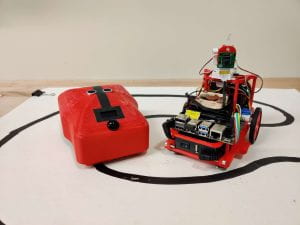Research
Our research interests center on the design and development of mechatronics systems and their applications in biomedical devices. Our research lab at the University of Washington Bothell, Smart Medical Devices Lab, is highly active in research; our team (consisting of undergraduate students at UW Bothell and graduate students at collaborating institutions) designs, simulates, builds, and assesses different smart devices in a variety of domains. We focus on three areas of ongoing research: 1) multi-modal medical diagnostic devices, 2) minimally invasive surgical robotics and smart user interfaces, and 3) assistive technologies (neural interface and assistive devices). The above three components can stand alone, but many times are tied together synergistically. These projects have been central to the fulfillment of PI’s main goals at the UW Bothell: establishing a sustainable undergraduate research group while reaching my full potential in research and scholarly activities.
Research Topics/Recent Projects
- Influence of Visual and Haptic Feedback on the Detection of Threshold Forces in a Surgical Grasping Task
- Soft Robotic Articulation of a Flexible Image Retrieval System
- Safe and Easy Use of Public Restrooms for Wheelchair Patients
- Virtual Curvature Recognition: Haptic and Visual Sensory Integration
- Automated Urinary Bladder Surveillance System for Cancer Diagnosis
- A Flexible Gastric Gas sensor Based on Functionalized Optical Fiber
- A Laparoscopic Grasping Tool with Force Sensing Capability
- RAVEN Eyes Around the Instrument from Modular Axis Sharing
- Actuated Imaging Probe for Generation of Additional Visual Cues in a Robotic Surgery
- Robotics Approach for Rehabilitation of Stroke Patients with Upper Limb Deficits
- Development of a cross-disciplinary robot for enhancing recovery after stroke-induced hemispatial neglect
- Development of a Collaborative Robot-Assisted Ultrasound System for CPR
- A Comparative Study of Different Wheelchair-toilet Transfer Approaches to Reduce Caregiver’s Work-Related Musculoskeletal Disorders
Example Images (Click images to switch to a larger image)
Active Projects
| Smart Wheelchair Projects (Assistive Technologies) | Human Perception Projects |
  |
  |
| Robot-assisted Ultrasound Projects | Rehabilitation Robot Projects |
 |
  |
Completed Projects
| Automated Diagnostics Projects | Soft Robotics Projects |
  |
  |
| Eye-on-tool Surgical Robotics Projects | Grasping Tool with Force Sensing Projects |
  |
 |
Research Collaborators
- Prof. Eric Seibel, University of Washington, Seattle, USA
- Prof. Jay Kim, Oregon State University, USA
- Prof. Myong-Kee Jeong, Rutgers, The State University of New Jersey, USA
- Prof. Pierre Mourad, University of Washington, Bothell, USA
- Prof. Jody Early, University of Washington, Bothell, USA
- Prof. Blake Hannaford, University of Washington, Seattle, USA
- Prof. John B. Troy, Northwestern University, USA
- Prof. Hyouk Ryeol Choi, Sungkyunkwan University, South Korea
- Prof. Yoon Sang Kim, Korea University of Technology and Education, South Korea
- Prof. Per G. Reinhall, University of Washington, Seattle, USA
- Dr. Thomas S. Lendvay, M.D., University of Washington, School of Medicine and Seattle Children’s Hospital, Seattle, USA
- Dr. Sangtae Park, M.D., University of Chicago Pritzker School of Medicine, Chicago, USA
- Prof. Sameer Sonkusale, Tufts University, USA
- Prof. Erika F. Parsons, University of Washington, Bothell, USA
- Dr. Robert M. Sweet, M.D., University of Minnesota in Minneapolis, USA
- Prof. Joel C. Perry, University of Idaho, USA
- Prof. Sanggyeun Ahn, PhD, the School of Art, University of Washington, Seattle, USA
- Prof. John-John Cabibihan, Qatar University, Qatar
- Dr. Julien Abi Nahed, Qatar Robotic Surgery Center (QRSC), Qatar Science and Technology Park (QSTP), Qatar